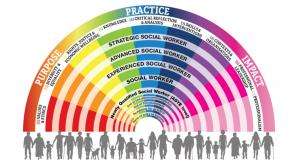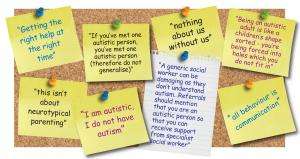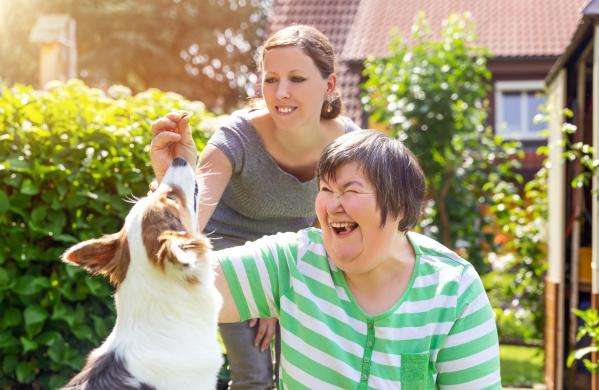Introduction
The Capabilities Statement for Social Work with Autistic Adults (the Capabilities Statement) was commissioned by the Department of Health and Social Care (DHSC) and developed by the British Association of Social Workers (BASW).
Written for the England practice and policy contexts, the Capabilities Statement was co-produced with autistic adults, their family and friends carers.
Reflecting the value-base of social work and in keeping with the requests of autistic adults who participated in this work, an identity-first term – ‘autistic adults’- (Kapp et al, 2013) is used throughout.
Social work and autism
Autism is a developmental condition that affects approximately 1-2% of the population (Centres for Disease Control and Prevention, 2019). Traditionally autism has been considered within a medical model that focusses on diagnosis and causation. Formal diagnosis is undertaken by clinicians – for example psychiatrists or clinical psychologists. Autism is a complex condition that affects everyone differently. Linguistic ability and comprehension of concepts and ‘typical’ social norms vary, with some autistic people exhibiting very high capacity in these areas whereas others have learning disabilities in addition to autism. Clinical diagnostic criteria include difficulties in two broad areas: social communication and restricted and repetitive behaviour or interests. Autistic people are likely to experience sensory issues and challenges with interoception, which affects the ability to feel hunger, pain, and thirst. Many autistic people have co-existing conditions including Attention Deficit Hyperactivity Disorder (ADHD), epilepsy, and mental health issues.
There has been increasing challenge to a clinical approach to understanding autism. This has arisen from several sources including autistic people writing about, and celebrating, their lives under neurodiversity. However, while some autistic adults question the value of formal diagnosis, others see it as beneficial. Furthermore, some people experience considerable impairments from their autism and related conditions, and combined with societal barriers, these can result in disabilities.
Social work with autistic adults is not primarily about whether they are diagnosed or not. It is about addressing needs and ensuring that people are not excluded from services because they do not have or accept a diagnostic label.
Due to their work in the community and their important role in connecting people to statutory services, social workers are intrinsic to signposting autistic adults to diagnostic
services where relevant; supporting them in the community and in hospitals; and working with and alongside autistic people and their carers to prevent crises and/or supporting them in the least restrictive manner.
This Capabilities Statement highlights the importance of relationship-based social work in securing the human rights of autistic adults through professionalism, advocacy, and leadership of agencies involved in service provision. The role of social workers in tackling inadequate and institutional practices is essential to ensuring the provision of good quality person centred interventions. Social workers contribute vital capabilities to support autistic adults to live the lives they choose in the community.
Generic social work capabilities as detailed in the Professional Capabilities Framework (PCF) (BASW, 2018) and the Knowledge and Skills Statement for Social Workers in Adult Services (KSS) (Department of Health (DoH), 2015) are foundations for all social work practice. This Capabilities Statement builds upon the PCF and KSS; and outlines the knowledge, skills and values essential for good social work practice with autistic adults. This Capabilities Statement is accompanied by a Continuing Professional Development (CPD) Pathway and supporting resources. It should be read in conjunction with the Capabilities Statement for Social Work with Adults who have Learning Disability and the Capabilities Statement for Social Work with Older People.
Methodology
The methodology to develop this Capabilities Statement comprised of:
- Two focus groups of autistic adults arranged and supported by Autistica
- A focus group of carers of autistic adults
- Two workshops attended by social workers from specialist autism teams and generic adult services and senior managers and commissioners of services
- Observations of different services using distinct care pathways for autistic adults
- Deep-dive discussions/telephone interviews with key stakeholders
- A Steering Group of autistic adults, carers, social workers, practice leaders, and academics which met regularly to provide oversight and strategic direction for the project
Who is this practice guidance for?
The Capabilities Statement provides guidance for professionals, managers and other stakeholders involved in delivering social work to autistic adults. It outlines expected practice standards for social work.
- Autistic adults, family, friends and carers – to understand the role of the social worker and the standard of practice that they can expect from them
- Social workers – to explore and understand capabilities associated with best social work practice with autistic adults regardless of practice location. This includes social work within generic and specialist services alongside the voluntary sector. 'It is also relevant to children's social worker - for example in transition planning, supporting children of autistic parents, and parents who have autism.
- Higher Education Institutions, researchers and providers of social work training – to develop and deliver curriculum content; plan the involvement of people with lived experience in teaching and research; develop assessment criteria, and identify practice learning requirements in the qualified and qualifying workforce
- Local authorities – to develop services, effective commissioning and review capabilities and to provide learning and development for all social workers
- Managers and leaders – to inform supervision and evaluation of practice through reflecting on components of the Capabilities Statements, to support recruitment and retention of staff and to inspire effective practice, organisational and systems leadership for excellence
- Practice Educators and University Education Providers – for teaching and assessing students’ capability and suitability to practice with autistic adults.
Links with the Professional Capabilities Framework and Knowledge and Skills Statement
The Capabilities Statement is framed by the Professional Capabilities Framework (PCF). It also supports social workers to meet the expectations of the Chief Social Worker for Adults in England’s Knowledge and Skills Statement (KSS) for Social Workers in Adult Services.
Together, the PCF and KSS provide the foundation for social work education and practice in England at qualifying and post-qualifying levels and are used to inform recruitment, workforce development, performance appraisal and career progression.
The PCF guides the development of social workers’ capabilities and confidence in managing risk, ambiguity and complexity at nine levels of practice across all specialisms…. The KSS set out what a social worker should know, and be able to do, in specific practice settings, in specific roles and at different levels of seniority’.
From Joint statement on the relationship between the Professional Capabilities Framework (PCF) for Social Work and the Knowledge and Skills Statements for Children and Families and for Adults – April 2018
Originating from the work of the Social Work Reform Board, the PCF outlines the generic capabilities that underpin all social work practice in England.
There are nine domains of capabilities in the PCF grouped under three overarching ‘super domains’ - Purpose, Practice, Impact.
As shown in the following diagram, the Domains of the PCF are:
- Professionalism
- Values and Ethics
- Diversity and Equality
- Rights, Justice, and Economic Wellbeing
- Knowledge
- Critical Reflection and Analysis
- Intervention Skills
- Contexts and Organisations
- Professional Leadership
Their generic PCF domains are important for social work with autistic adults. However, this Capabilities Statement defines specific capabilities that enhance and deepen social work practice with adults with this lived experience.

Structure of the Capabilities Statement
The Capabilities Statement is structured around the PCF ‘super domains’ Purpose, Practice, and Impact. These inter-relate, but each focus on three discrete areas of professional development.
- The Purpose section of the Capabilities Statement describes the values, ethics and approach to rights and equalities that social workers need to demonstrate to make a positive impact for autistic adults who often experience (or at risk of) social exclusion and discrimination
- The Practice section describes the knowledge, skills and critical reflection capabilities specific to social work practice with autistic adults
- The Impact section shows the professionalism, organisational, leadership, and self-management skills that are needed in this area of practice.
Consultations with social workers: key message
Social workers involved in developing this Capabilities Statement were asked to identify the most important values and skills for practice with autistic adults. The answers are captured in a Word Cloud, shown above. It shows that social workers propose a practice framework underpinned by the profession’s values enshrined in The Code of Ethics for Social Work (BASW, 2014), relationship-based social work skills, and a desire to achieve positive outcomes for autistic adults.
Consultations with autistic adults: key messages
The key messages from autistic adults during the consultations to develop this Capabilities Statement are captured below.

